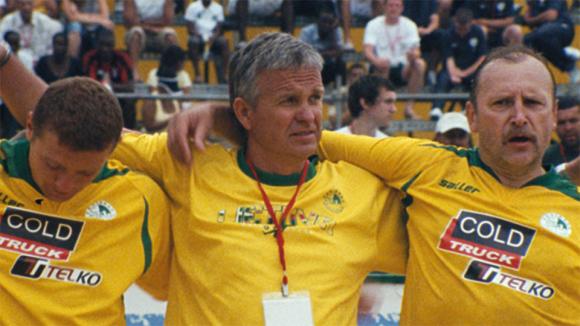After the premiere. A couple of goals for the film (Alcofootball)

That screening in the cinema theatre "Pasaka" was devoted to the film heroes – men who managed to give up alcohol or drugs, and are now playing football. The team, with which they are training, serves them as the company and the family, and the game - as the support, which helps them not to go back to where they've been.
When they, after the training or game began to gather in the narrow theatre lobby, I could not take my eyes off. What faces! What types of character! What behind it stories. Attractive and strong, funny and ironic, real winners - that's what their posture was saying. I understood the director Kestutis Gudavičius and cinematographer Vilius Mačiulskis who made "Alcofootball". A filmmaker can not pass quietly by such people. These men had to be put on the screen.
In "Alcofootball" I watched enough games. Intrigue from the very beginning: Lithuanian team participates in the 2010 Homeless World Cup. No just any place. In
Naturally, a documentary that has undertaken to reveal the phenomenon linking a group of people, chooses some of that group. Those who are the most expressive, and through their stories we can experience the diversity of the phenomenon. The coach has overcome the trouble, which is actually a serious illness, he now helps others to pull through, showing by his own example that anything is possible, even the dreamed blue Cadillac "slowly rises" from the details. One of the players has given up alcohol, although the need for it constantly lies within, and it is very difficult to withstand. Another active player is a former drug addict, a thief, eternal customer of police, repeatedly brought back from the exit to the beyond, who had been feeling totally unwanted, even by his parents. Now they are footballers. Strong, united, smiling, having climbed out of their abysses.
Men are reluctant to open up in detail, and that is good. It is slightly worse, that their image does not evolve in the film. In the monologue passages that are built in throughout the film in a dotted line, they say practically the same thing: they gave up, and football helps to withstand. Images from the match also add little to their portraits. Well, they play, win or lose, celebrate or grieve. They became the heroes of the film, but the director fails to put their involvement, speaking, playing into the stories. The emphases of the "Alcofootball" storyline suggest to follow the process of the championship, but not of the human life. Maybe this film is for football fans who are concerned about who will become the champion among the homeless people of the world?
In this film of interesting and unexploited topic, I see lots of beginnings, opportunities, which just after they enter the screen, are immediately shot out from it like that soccer ball, which was reached by the foot of the other team's player. Those beginnings – are the fates, emotions, states. Of alcofootballers, participants of the homeless world cup. The authors of the film did not see? did not show? did not search? have hidden? what was behind those spoken words, behind the smiles for the camera, behind all the games. Things are subtle, difficult to pronounce, and one might shy away from revealing them. It is easier to refrain from going into deep, it's easier just to shoot (this path was chosen not only by the cameraman, but also by the director and the crew). And then again, the ball is kicked, amid the captivating music. If here – in the film, on screen – is a match going on between alco and football, football wins. It is good in life, but in the film alco remains like a secondary sign of trouble that was once overcome, which in no way compares to football. The Alco match took place behind the scenes. We see the winners and narrators of their own matches.
There is an episode in "Alcofootball" for which the director and cinematographer deserve a praise, but regretfully it is just alone of its kind. In
This is already a goal on behalf of the cinema. And then the camera again runs after the football. Since I am not the fan of sports but of the cinema, I found more interesting things in the theatre hall, not on the screen.